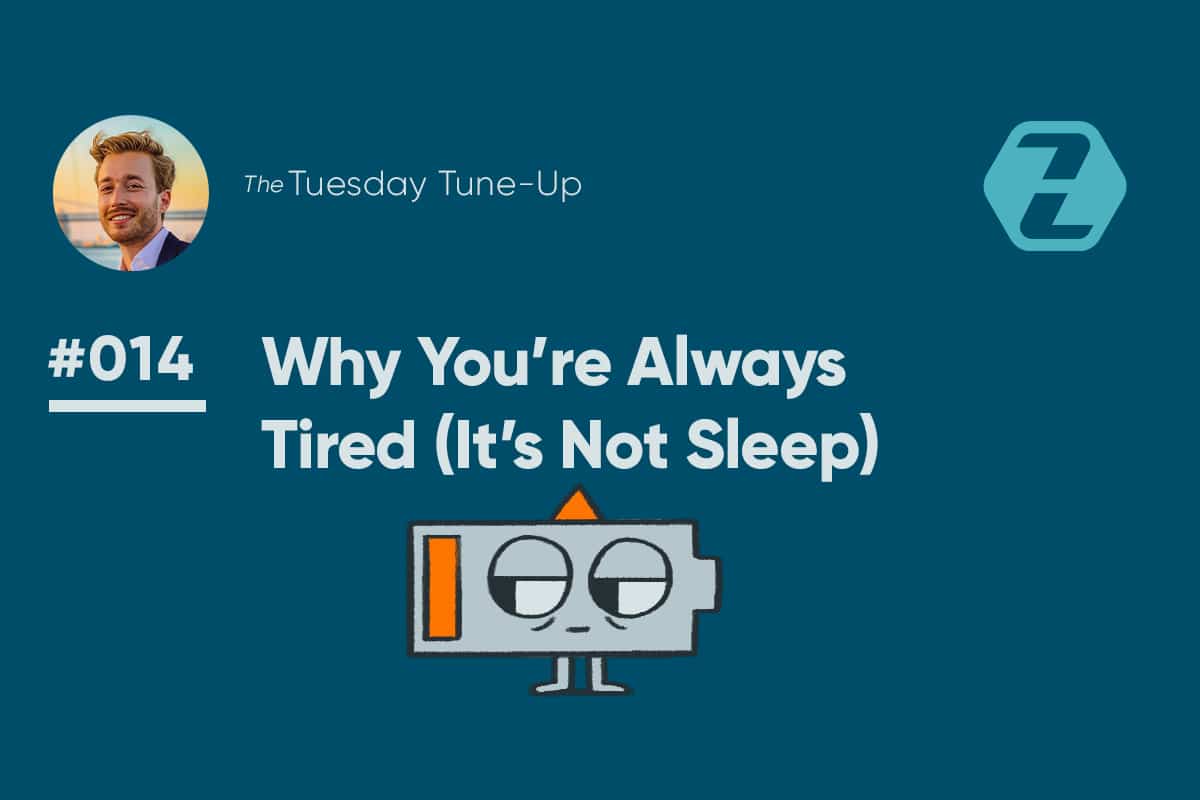
Do you ever feel like you are always tired no matter how much sleep you get?
That you feel like you are fighting against some unbearable weight, that makes it impossible to get any task started, let alone finished?
The scary thing is, I’m seeing this with not just people who don’t sleep enough but with people who sleep more than enough. My 17-year-old cousin, 30-year-old friends, and 60-year-old aunts all seem to be facing this same problem. What’s going on here?
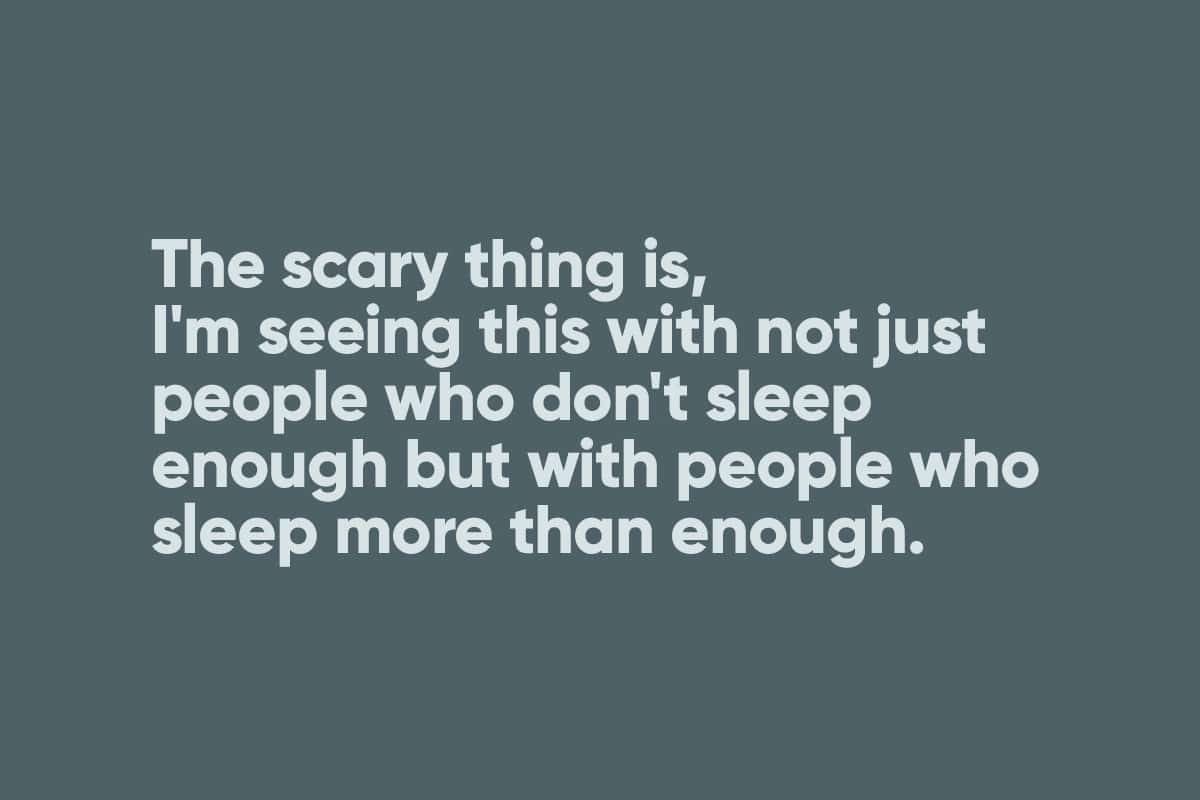
Most people, like me initially, will think, I know the answers here! Physical and mental health. I just need to sleep more and maybe exercise a little bit. The problem is, you aren’t being specific enough and it’s not just sleep and exercise. You need to get granular here and create a plan; otherwise, you (like me) will fall into the same habits, the same low-energy states, that plague your creativity, happiness, and ability to get what you want out of life. Here’s how to not be tired, once and for all.
If I am ever tired for more than two days, I check on these eight things and fix it 99% of the time.
By the end of this post, you will know how to:
- Eliminate habits that are keeping you awake
- Understand Circadian Rhythms
- Sleep 10x better
- Feel 10x
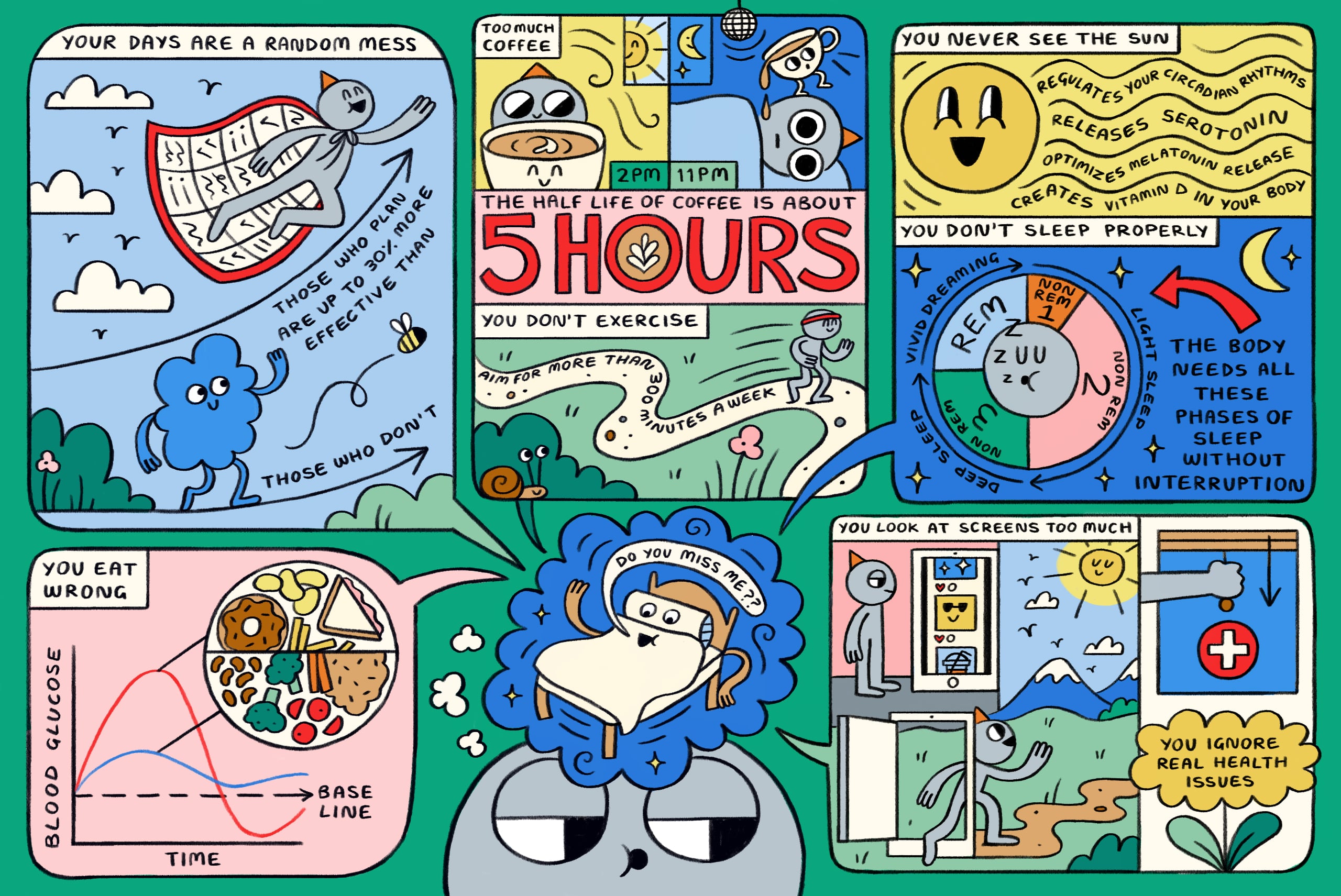
1. You eat wrong
Sugary and ultra-processed food is killing your energy.
Ever notice after a big lunch, you feel a slump? Requiring a coffee or energy drink to wake you up? This habit is killer for two main reasons:
- It treats the symptom, not the cause
- Caffeine sticks in your system into bedtime
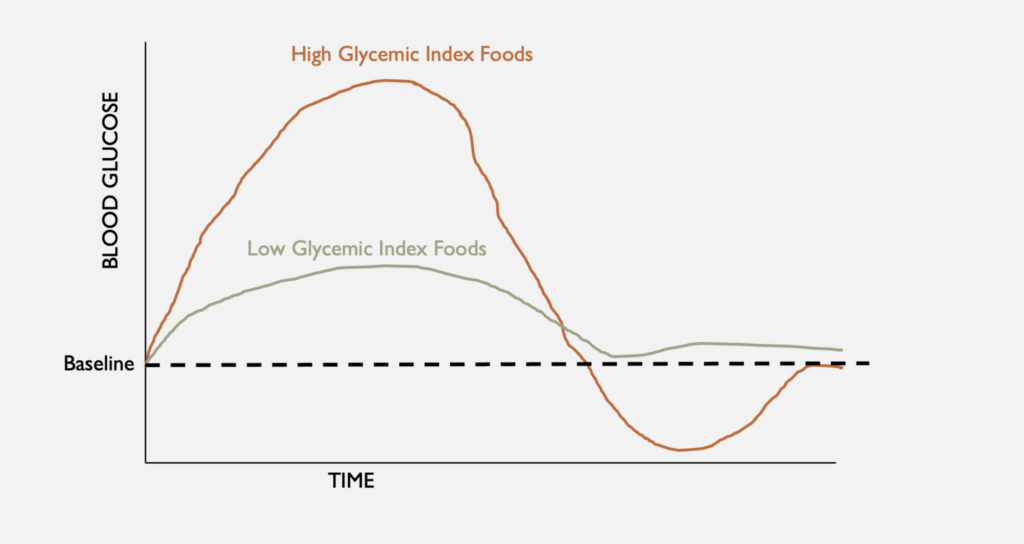
When you drop below the dotted baseline, your body is in a very low blood glucose state because you went into overdrive to store all the sugar and junk you just put in your body at the spike point. Once you hit the baseline, however, your insulin is still firing away, bringing your blood glucose down to a zzzz-inducing-low.
Now, if you ate, for example, a big protein, big vegetable, and small carb meal, as opposed to a spicy chicken sandwich from Wendy’s with a Frosty (my favorite), your blood sugar would look more like the green line, preventing the crash.
I hear it parroted over and over again that people don’t eat lunch because they feel like it sucks their energy away.
It’s not because they ate lunch that they are in a slump; it’s because of what they ate for lunch.
Finally, a fancy society labeled food processing at four levels (1 being minimally processed and 4 being ultra-processed). 1, for example, is fresh meats and vegetables, while 4 is cookies and candy bars.
One study showed that people who eat the most class 4 food have a significantly increased risk of being overweight or obese (+39%), having a high waist circumference (+39%), and metabolic syndrome (+79%). Obesity is associated with higher risks for fatigue, depression, and anxiety.1,2
Fix it: aim for minimally processed foods with a low glycemic index.
2. Your days are a random mess
Those who plan are up to 30% more effective than those who don’t.3
Something called “switching cost,” which researchers at UC Irvine discovered, causes a cognitive switching penalty whenever you are distracted and change tasks. It takes an average of 23 minutes and 15 seconds to refocus on an original task when distracted.
So, if you get distracted even once every 30 minutes, it is too much. And guess how much more likely you are to be distracted when you don’t have a plan?
One of the most significant improvements in my ability to stay efficient was reading the 12-Week-Year and being specific with my goals.
I strongly recommend taking 30 minutes to an hour or, even better, reading the book and doing the tasks below to create an explicit plan. It’s changed my life:
- Define your aspirational visions. What would your dream life look like? (hardest part, but it can change everything)
- Create two to three reasonable 12-week goals that align with the vision
- Create weekly goals based on the big goals above
- Before every week, outline which and at what time during each day you are going to accomplish the individual tasks necessary to complete the weekly goals
- After every week, critically assess what went well and what didn’t. *Bonus* Chat with 1-2 friends to stay on track with your goals (this is what I do).
Here’s an example of my schedule for a recent week:

3. You drink coffee too much (or Celsius)
So, after lunch, you have that big coffee; it perks you up a little. But at 11 PM., you can’t sleep. You are tossing and turning and have no idea why. I’ll tell you why. It’s the coffee or, more likely, that 2nd Celsius.
The half-life of caffeine is about 5 hours. That means if you drink 2 Celsius drinks at 1:00 PM, 400 mg of caffeine, at 11:00 PM, you will still have 100 mg of caffeine in your system. It will be like you just drank a coffee (100 mg of caffeine, average in a cup of coffee, still in your system):
- 1:00 PM, 2 Celsius drinks, 400 mg Caffeine
- 6:00 PM, one half-life, 200 mg Caffeine in-body (2 cups of coffee)
- 11:00 PM, two half-lives, 100 mg Caffeine in-body (1 cup of coffee)
Obviously, the harm here is that when you don’t sleep, you reinforce this positive feedback loop of suck.
You wake up tired because, finally, when the caffeine has left your system, it’s 8 AM. But, you must go to work and have energy, so you drink coffee. In the afternoon, you are even more tired because you didn’t sleep last night, and your body is demanding sleep at this point, so you drink more coffee, which causes you to stay up later at night, and so on and so on.
Fix it: Aim for <50 mg of caffeine to remain in your body one hour before bed. A good rule of thumb is no coffee after 10 AM, which gives your body a shot at ~2.5 half-lives by 10 PM.
4. You don’t exercise
Exercise is a magical energy generator. If you only listen to one thing, listen to this section. Doctors, researchers, and centenarians worldwide repeat it over and over: exercise more.
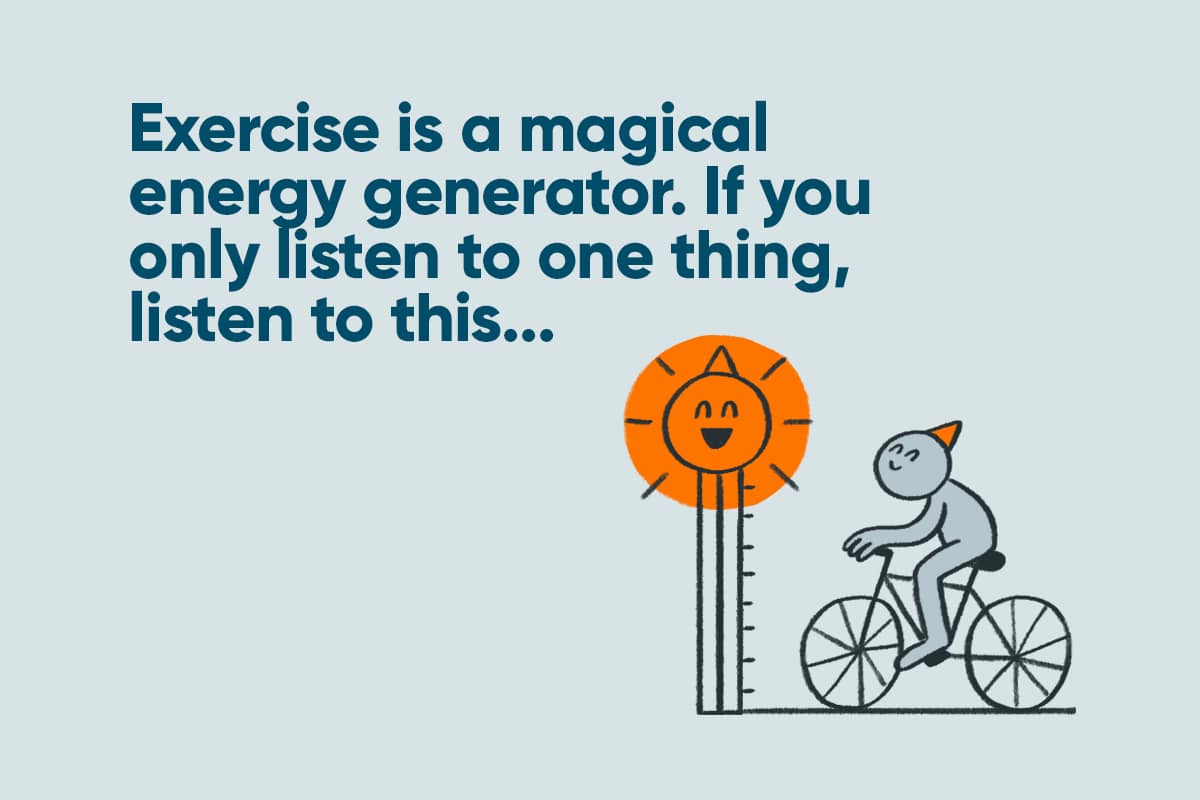
The only two things in the world that have given me more benefits than exercise are good sleep and good relationships; nothing else beats it. Not nature, not eating right, not work achievements, not reading.
- Exercise INCREASES: cardiovascular health (oxygen to the brain and muscles), mood (releases endorphins, and lifespan
- Exercise DECREASES: cancer risk, heart disease risk, depression risk, anxiety risk, and fatigue.
How to fix it: Aim for more than 300 minutes a week by picking a fun activity (I love soccer), adding weight lifting, and then adding walking to get to that 300 minutes after factoring in the fun activity and weight lifting. Schedule it weekly (as you can see I did in my schedule above). *Bonus* check out Peter Attia’s website to exercise properly.
5. You never see the sun
We weren’t designed to be in cubicles with artificial light and no sun for 23 hours a day. Sunlight:
- Regulates your circadian rhythm (wake and sleep cycle)
- Releases Serotonin (what most anti-depressant drugs interact with)
- Optimizes melatonin release (helping you sleep)
- It literally creates vitamin D in your body (bone health, nerve functions in the brain and muscle, and immune system help)
People spend on average about 1 hour outside, which is a dramatic decrease from the 6-8 hours of our species’ emergance.11
In 2019, Nature released an article that examined nearly 20,000 adults’ time in nature. They found that at least 120 minutes outside was linked with significantly greater reports of good health or high well-being, with peak associations between 200-300 minutes per week.12
The morning is the best time to get it. Studies show that people who get 30 minutes of sunlight in the morning sleep better and have higher energy levels throughout the day.5
Fix it: 30 mins of sunlight in the AM
6. You don’t sleep properly
Alright, alright, I said it wasn’t because of the amount of sleep, and it (kind of) isn’t!
The pure amount of sleep is an okay number to consider, but we really want high-quality sleep.
The body needs all these weird kinds of sleep for people to feel the best and do the best work the next day:6
- Non-REM Sleep (NREM, Stage 1 and 2) – 50% total sleep time, memory processing, cognitive function
- NREM Deep Sleep (Stage 3) – physical recovery, immune function, conginitive health, and metabolism/weight control
- REM Sleep – emotional regulation, memory, and learning
The issue with poor sleep is that the sleep cycle looks something like this:

When we interrupt our sleep, we may only get Stages 1 and 2 over and over, not gaining the benefits of physical recovery, cognitive health, emotional regulation, and weight control we get from NREM 3 and REM.
In one of my favorite experiments, subjects were taught a complicated way to solve a math problem. However, there was secretly a much easier way to solve that problem, which none of the subjects discovered during that training.
What happens if you retest them 12 hours later, without sleep? Well, some get it, some don’t. But what if you test them after a night’s sleep at that same time interval (12 hours)? The discovery rate of this “easier” way more than doubles.7 Good sleep is magic.
Fix it: Expose yourself to sunlight after waking for 30 minutes (outside), no coffee or alcohol or nicotine at all, avoid napping, exercise during the day, have a hot shower 1 hour before bed, no food 3 hours before bed, no exercise 5 hours before bed, create a bedtime routine, go to bed at the same time every day.
7. You look at screens too much
Now, using screens before bed is no bueno because of sleep blabla, but the big problem with screens is that higher screen time is nearly always associated with more sedentary time.
1/4 Americans spend 70% of their waking hours sitting and virtually never exercise, so they are classified as sedentary.8 Not only that, when we finish work, we nearly always sit on a couch, in front of a computer, or in front of a TV.
And here’s the problem: when we are sedentary, our risk for metabolic issues skyrockets. Some studies show simply being in the top 25% of a sedentary lifestyle increases our chances of obesity and metabolic issues by up to 30%. And, of course, those issues are associated with dramatically worse energy levels and health.10
One fantastic study looked at 10,000 people in Atlanta, Georgia. They found that for every additional hour spent in the car there was a 6% increase in the likelihood of obesity, while each additional kilometer walked per day was associated with a 5% decrease in the likelihood of obesity.9
Fix it: Fewer screens mean and outside time. Can you convert your phone or Zoom meetings to walk meetings?
8. You ignore real health issues
Even though this is tip #8, it should be the first thing you do to improve long-term Energy. Now, even though I am a doctor, I’m not your doctor. I suggest you ask your doctor if any of your medications or conditions affect your ability to maintain energy.
Or, in the likely case, when you aren’t even seeing your doctor, psychiatrist, or healthcare provider who knows you and your issues and can genuinely help you. See that provider.
For example, one of my friends recently found it hard to focus and had awful energy for about two weeks. He finally saw a doctor, and not only did he find out he had Lyme disease (a nasty bacterial infection from ticks), but also iron-deficiency anemia! No wonder he was feeling like junk! A month later, he had finished his treatments and had more energy than ever. He wasn’t doing fancy things with sunshine, or caffeine, or exercise, he just saw his doctor.
Summary:
Alright, let’s get some energy. Here’s why you are always tired and how to fix it:
- You eat wrong -> eat more low glycemic index foods and less processed food
- Your days are a mess -> get clear on your big life vision and make specific hourly plans around it
- You drink coffee too close to bed -> try to hit <50 mg of caffeine in your body 1 hour before bed
- You don’t exercise -> try and hit 300 mins per week (AHA rec 150 minutes, but another paper shows a dose-dependent response, which means the more exercise, the better, with significant results that plateau around 300 mins/week).
- You never see the sun -> see the sun
- Improper sleep -> Read this post.
- Too much screen -> avoid a sedentary lifestyle at all costs, drive less, sit less, walk more
- Not taking care of medical health -> talk to your doctor!
I hope that helps. If I am ever tired, I go through these eight things, and 99% of the time, I find the culprit for my low energy.
Work Cited:
- Pagliai G, Dinu M, Madarena MP, Bonaccio M, Iacoviello L, Sofi F. Consumption of ultra-processed foods and health status: a systematic review and meta-analysis. Br J Nutr. 2021 Feb 14;125(3):308-318. doi: 10.1017/S0007114520002688. Epub 2020 Aug 14. PMID: 32792031; PMCID: PMC7844609.
- Vgontzas AN, Bixler EO, Chrousos GP. Obesity-related sleepiness and fatigue: the role of the stress system and cytokines. Ann N Y Acad Sci. 2006 Nov;1083:329-44. doi: 10.1196/annals.1367.023. PMID: 17148748.
- Orbell S, Hodgkins S, Sheeran P. Implementation Intentions and the Theory of Planned Behavior. Pers Soc Psychol Bull. 1997 Sep;23(9):945-954. doi: 10.1177/0146167297239004. PMID: 29506445.
- https://ics.uci.edu/~gmark/chi08-mark.pdf
- Mead MN. Benefits of sunlight: a bright spot for human health. Environ Health Perspect. 2008 Apr;116(4):A160-7. doi: 10.1289/ehp.116-a160. Erratum in: Environ Health Perspect. 2008 May;116(5):A197. PMID: 18414615; PMCID: PMC2290997.
- Irwin MR. Why sleep is important for health: a psychoneuroimmunology perspective. Annu Rev Psychol. 2015 Jan 3;66:143-72. doi: 10.1146/annurev-psych-010213-115205. Epub 2014 Jul 21. PMID: 25061767; PMCID: PMC4961463.
- Wagner, U., Gais, S., Haider, H., Verleger, R. & Born, J. Sleep inspires insight. Nature 427, 352–355 (2004).
- Owen N, Sparling PB, Healy GN, Dunstan DW, Matthews CE. Sedentary behavior: emerging evidence for a new health risk. Mayo Clin Proc. 2010 Dec;85(12):1138-41. doi: 10.4065/mcp.2010.0444. PMID: 21123641; PMCID: PMC2996155.
- Frank LD, Andresen MA, Schmid TL. Obesity relationships with community design, physical activity, and time spent in cars. Am J Prev Med. 2004 Aug;27(2):87-96. doi: 10.1016/j.amepre.2004.04.011. PMID: 15261894.
- Mielgo-Ayuso J, Aparicio-Ugarriza R, Castillo A, Ruiz E, Avila JM, Aranceta-Bartrina J, Gil A, Ortega RM, Serra-Majem L, Varela-Moreiras G, González-Gross M. Sedentary behavior among Spanish children and adolescents: findings from the ANIBES study. BMC Public Health. 2017 Jan 19;17(1):94. doi: 10.1186/s12889-017-4026-0. PMID: 28103843; PMCID: PMC5244608.
- Diffey BL. An overview analysis of the time people spend outdoors. Br J Dermatol. 2011 Apr;164(4):848-54. doi: 10.1111/j.1365-2133.2010.10165.x. PMID: 21128911.
- White, M.P., Alcock, I., Grellier, J. et al. Spending at least 120 minutes a week in nature is associated with good health and wellbeing. Sci Rep 9, 7730 (2019). https://doi.org/10.1038/s41598-019-44097-3
